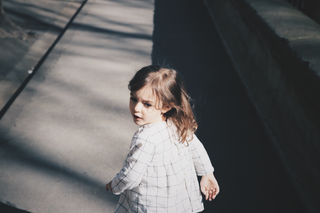Unloved Daughters and the One Question You Must Stop Asking
Unloved Daughters and the One Question You Must Stop Asking
Why you may be blocking the pathway to healing

Source: Photograph by Caroline Hernandez.
It was the question that kept me up at night in my childhood bedroom, and my need to find the answer was as burning as that which inspired the knights to search for the Holy Grail. If I could answer the question, then I would know what I had to do and who I had to be to get her love. The problem is that the unseen foundation for the question is a deep, dark hole filled with fear and shame because the world the child lives in is tiny and ruled by her mother and the answer that comes most easily to mind is this one: Because of who I am. She doesn’t love me because I’m me.
I didn’t know then that in bedrooms elsewhere, other little girls tossed and turned, asking themselves the same thing so that they could be loved by their mothers. I thought I was the only one.
The question becomes more poignant, more urgent, when the unloved child sees her that her mother can love another child in the household, as one woman, now 52, confided:
“I was six when my sister was born and I remember feeling as if a wall had fallen on me, leaving me breathless, when I watched my mother sing and coo, smile at her, showering her with affection and touch. She never did those things with me. I tried to be cuter, sweeter, hoping that she would love me like my sister but it never worked. Ever.”Fear, shame, and, yes, that frightening but ready answer to the question keep many unloved daughters from asking it in childhood and, sometimes, long into adulthood. Their own hardwired need for their mothers’ love and support keeps them engaged in what I call the dance of denial; they make excuses for, rationalize, and look away from their mothers’ treatment of them, ignoring the effect it has on them the best that they can. And while they hurt and suffer, they unwittingly keep the cycle of pain and sometimes self-loathing going. Unconsciously, they accept the answer to the question they haven’t consciously asked: Because of who I am. She doesn't love me because I'm me, One woman, now in her sixties, reflected on how it worked in her life:
I ran from the knowledge that she didn’t love me by excusing her cruelty and, yes, she was terribly cruel to me. I thought it was because her own childhood was hard and, somehow, she resented the privileges I was born into. I couldn’t face the fact that she was jealous and begrudged me everything. Instead, I worked endlessly to try to please her but it never worked. I never felt good about myself, not ever. She died when I was fifty and left me nothing, not even a teacup. I was stunned but awoken at the same time. In counseling, I discovered who I was. Fifty years. That’s how long it took for me to understand I was deserving of love.
The problem with the question
For starters, the question sounds logical enough but the truth is that it doesn’t have an answer—not the kind of answer that would permit the unloved daughter to devise a plan of action which is what she really wants. Mothers don’t love their children for many reasons or none at all. Focusing on the question doesn’t just kick up hopefulness— thinking that maybe you can somehow change so you can become lovable to her—but it fosters the wrong-headed belief that it’s about you and who you are. It isn’t. It’s about her and who she is. That’s the hardest thing for a daughter to see because she’s internalized all the guilt and shame that underlie the question. After all, everyone knows that all mothers love their children, right?

